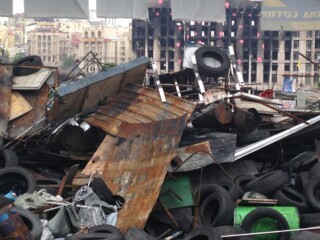In Kiev
Peter Pomerantsev
‘Russia,’ the Russian writer said, ‘is pitted against the West because of its deeper sense of spirituality.’ He was speaking at a conference in Kiev bringing together ‘international intellectuals to carry out a discussion about the meaning of Ukrainian pluralism for Europe, Russia and the world’. It was hot in the room. I felt sick and went down to Maidan, my first visit since the revolution.
The barricades are still standing in the centre of Kiev. As wide as high streets and many metres tall. They are made of advertising hoardings, paving stones, logs, beds, bins, skips, sandbags, posts, trellises, wire, sheds, shoes, pipes and street signs. It almost looks as if the fabric of the city had risen up and rebelled. There’s a large metal structure which I couldn’t make out.
‘It’s part of a playground,’ one of the Maidan revolutionaries explained. They are still there too, living in tents by the barricades.
‘How did it get here?’ I asked.
‘People just dragged it.’
There are thousands of tyres, used as ramparts or set on fire as burning walls. During the fighting people bought spare tyres from their garages, or went out and bought new ones and carried them to Maidan still packed in cellophane, the subways rammed with people carrying tyres.A revolution can transform not only the meaning of a person in society but the meaning of objects. What in another context would be unsightly mountains of rubbish here have become symbols of resistance and sacrifice.
Near the metro, tyres and bits of pavement have been stacked together to form a sculpture-totem to the revolution. But what the barricades most immediately recall are Joseph Beuys installations. Or rather they reply to them: if in Beuys rubble is often taken to signify the collapse of European civilisation and society, here it is the opposite: society rising up, a dream of Europe recovered.
In among the barricades are framed photographs and flowers, to commemorate those who were killed in the fighting. The Maidan is also a temple. There are improvised mounds of mourning: piles of rubble topped off with a candle and a photo. When I passed by, several dozen relatives of the dead had gathered by the photographs. A priest led swelling prayers. Many of the relatives had returned to the place their loved were killed for the first time. Many cried, kissed and stroked the photographs. Then the mourners walked up the hill towards Parliament to ask why there was still no result of the investigation into the killings.
By the time I got back to the conference, the discussion was about ‘how Maidan transformed culture’. Western guests who like me never fought on the Maidan were eulogising the revolution. Bernard-Henri Lévy was there too. The Kharkiv writer Serhiy Zhadan, who has risked his life to fight for the Maidan in eastern Ukraine, looked irritated: ‘We’re kidding ourselves if we think the Maidan has transformed everything,’ he said when he took the microphone. ‘Those who were pro-Europe, pro-change are more so. Those who were against are more so. In Donetsk the same symbols of Maidan are looked on with hate. Come on. Get serious.’

Comments
There is an awful lot wrong with the way that the situation is reported in western Europe, objectivity has gone out of the window and the reporters seem to have declared Cold War2.com as being under way. The intellectuals are meeting to talk about the situation, which is good - at least they won't declare war on Russia, which is what Timushenko seems to want to do.
On the “transformation” issue, Timothy Snyder’s recent piece in The New Republic about “Ukraine meaning everything” (for the future of Europe, for the future of democracy, etc.), was certainly a bit of over-reach. Snyder is a good historian of the region, but the more rhetorical parts of his piece verged on the hysterical. A lot of folks seem to be going down this “do or die” path, unwisely.
Just how many of the protestors actually see the “European project” as primary or even important is unknown, and will probably be irrelevant. After all, many Ukrainians wish to see improved government, based on controlling corruption, reducing the influence of oligarchs, establishing a rule of law based on tolerance of differences among people, making the economy work better, etc., and all of these do have practical solutions once the temperature is lowered. Relations with the EU and Russia may feed into these solutions, but are, in a sense, secondary. It seems more pressing to establish a working nation before obsessing about “national security” issues.
Is Putin a “total villain” (or spoiler), an opportunist who will take what he can get without risking anything serious, or a man who represents the legitimate interests of some of Ukraine’s citizens? Or some combination of all of the above? It’s very hard to say, just as it is difficult to judge what the real plans and goals of the present Kiev group are and of the people elected on 25 May will be. Pomerantsev, sensibly, dwells in the realm of uncertainty about these matters.